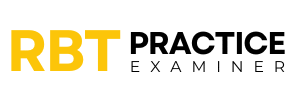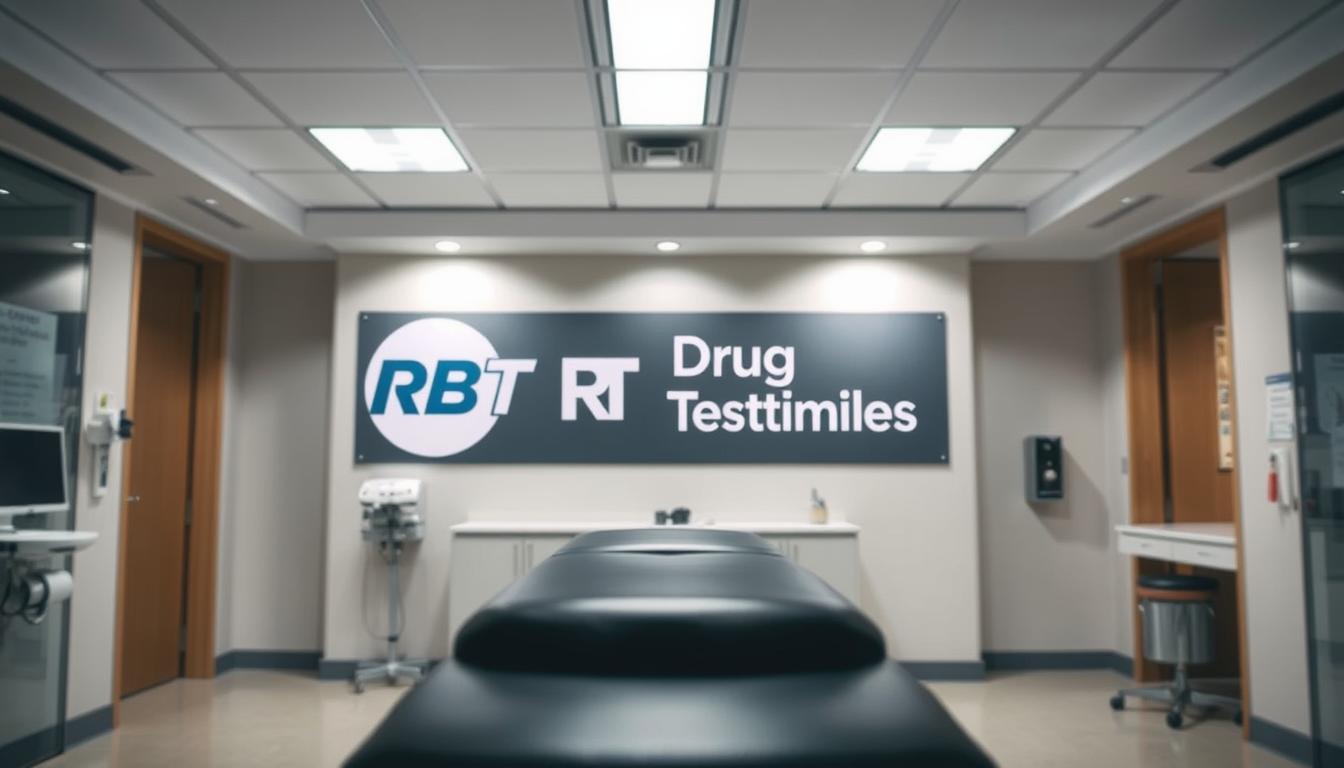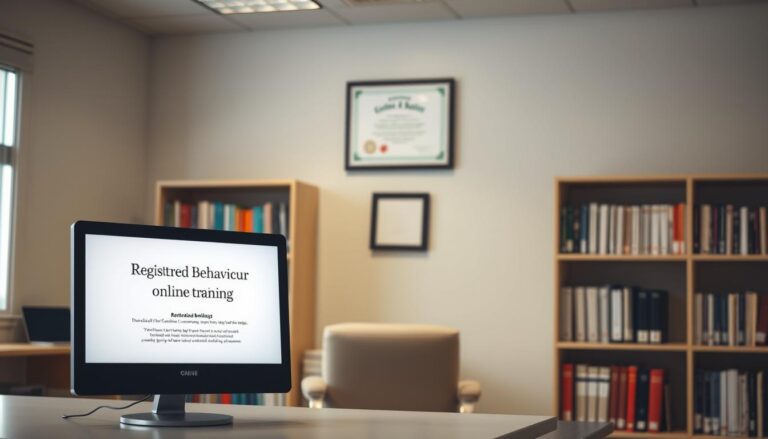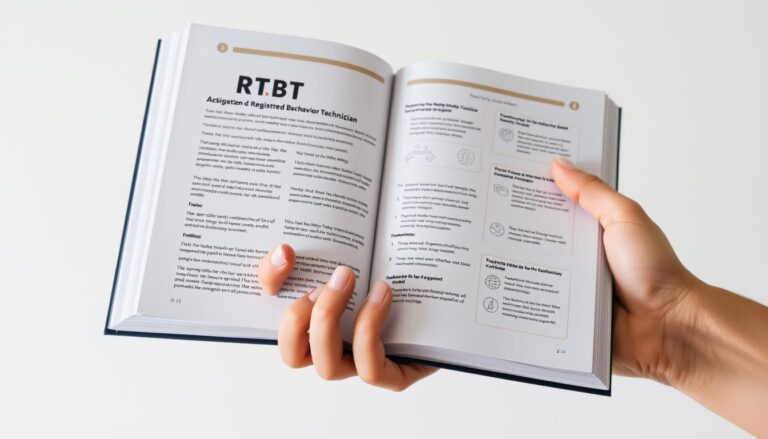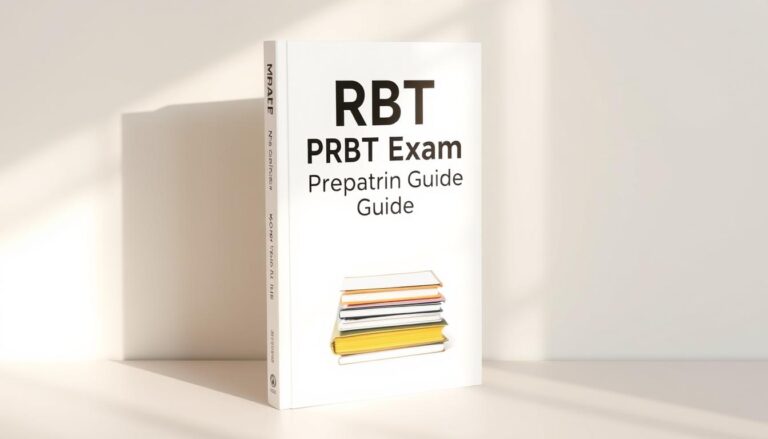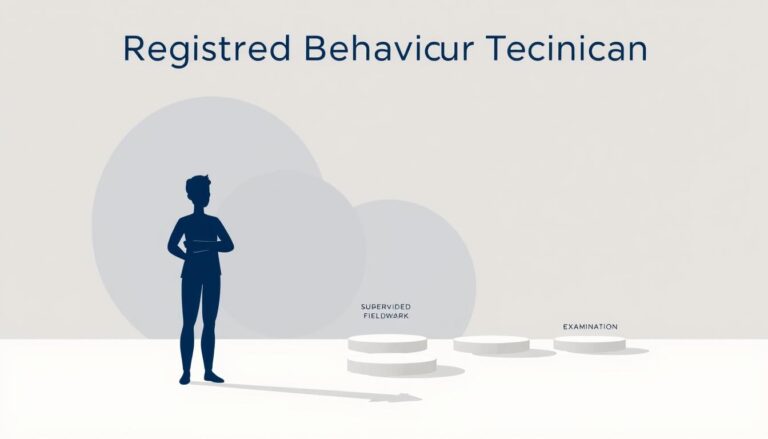RBT Drug Testing: The Facts You Should Know
Drug testing is key in healthcare, important for Registered Behavior Technicians (RBTs). They work with people who need special care. Knowing about RBT drug testing policies helps keep patients safe and professionals honest.
Do RBT get drug tested? Yes, they do. Health care groups test them to make sure they’re up to the task. This is to protect those they help and keep the workplace safe.
Drug testing does more than follow rules. It keeps patients safe, makes sure the workplace is safe, and helps keep the reputation of behavior technicians high. They play a big role in helping people with autism and developmental disabilities.
The tests check for any drug use that could harm patient care. Employers and groups that certify RBTs take these tests very seriously. They know how important it is for the quality of care and safety of clients.
People in this field need to know drug testing isn’t about getting in trouble. It’s about keeping the highest standards and giving the best support to those who need it.
Understanding RBT Drug Testing Requirements
Drug testing for registered behavior technicians (RBTs) is key to keeping healthcare safe. It makes sure clients are safe and services are honest.
The Behavior Analyst Certification Board (BACB) sets strict rules for RBT drug testing. These rules cover:
- Pre-employment screening protocols
- Random drug testing procedures
- Ongoing compliance verification
- Substance abuse prevention strategies
Drug testing rules differ in healthcare settings. Employers use certain tests to:
- Keep clients safe
- Keep workplaces professional
- Make sure technicians are ready to work
Professional standards require RBTs to pass detailed drug tests. This shows they care about doing the right thing and keeping clients safe. These tests find any drug use problems that could hurt patient care.
Healthcare groups and state boards work together to make drug testing rules. Each place has its own rules. So, RBTs need to know the local laws and follow them closely.
Do RBT Get Drug Tested: Common Questions Answered
Registered Behavior Technicians (RBTs) are key in helping people with behavioral issues. It’s important for them to know about drug testing rules. This testing keeps patients safe, upholds professional standards, and keeps behavioral health services honest.
Many RBTs, both new and experienced, ask about drug testing. The truth is, yes, RBTs do get drug tested. These tests are a big part of getting and keeping a job in this field.
Pre-employment Testing Procedures
Job seekers for RBT roles should get ready for drug screening. Here’s what usually happens:
- First screening when applying for the job
- More detailed test before they’re hired
- Checking if the test shows no drugs
Ongoing Screening Requirements
Does RBT need drug tests after they’re hired? Yes, they do. Health care places do regular tests to keep things professional. They also test randomly to keep everyone safe at work.
Random Testing Protocols
Random drug tests are a big deal for RBTs. These surprise tests help keep the workplace honest and safe for patients. RBTs should always be ready for these tests.
Knowing and following drug testing rules is key for RBTs. These rules help protect patients, coworkers, and the quality of care in behavioral health.
Legal Framework for RBT Drug Testing
Registered Behavior Technicians (RBTs) work in a legal world of drug testing rules. These rules come from both federal and state laws. They are made to keep both healthcare workers and their clients safe.
Important legal points for RBT drug testing include:
- Americans with Disabilities Act (ADA) protections
- Workplace safety regulations
- State-specific healthcare employment laws
- Professional certification standards
The rules for RBT drug testing focus on keeping patients safe and upholding professional standards. Federal laws require detailed screening to balance privacy with safety. Employers must follow strict rules to avoid discrimination and protect workers’ rights.
State laws can differ a lot, making the legal world for RBTs complex. Some key legal protections are:
- Protection against unfair testing
- Keeping medical info private
- The right to dispute test results
- Accommodations for medical needs
Healthcare groups must carefully handle these legal issues. They need to make sure drug testing is fair, consistent, and follows both federal and state laws.
The legal system tries to make a safe work place while respecting RBTs’ rights. Knowing these rules helps employers and employees keep high standards of care and conduct.
Types of Drug Tests for Registered Behavior Technicians
The rbt drug screening process uses various tests to keep Registered Behavior Technicians safe and professional. Knowing these tests helps everyone meet high standards of care.
There are many ways to test for drugs in healthcare. Each method has its own strengths in finding drug use.
Urine Drug Testing
Urine tests are the most common for RBTs. They have several benefits:
- Detects a wide range of substances
- Cost-effective screening option
- Quick and non-invasive collection process
- Accurate results within 24-48 hours
Saliva Testing Methods
Saliva tests are a less invasive option. They can find recent drug use with little discomfort:
- Short detection window (24-48 hours)
- Immediate on-site testing capabilities
- Difficult to manipulate or cheat
- Minimal privacy concerns
Hair Follicle Analysis
Hair follicle testing can find drug use for up to 90 days. This method is very accurate for long-term screening. It has several key features:
- Extremely accurate long-term screening
- Detects historical drug use patterns
- Challenging to circumvent
- Comprehensive substance detection
Healthcare groups pick drug tests based on accuracy, cost, and standards. They aim to find the best balance in rbt drug test procedures.
When Drug Testing is Required for RBTs
Registered Behavior Technicians (RBTs) must pass drug tests to keep their work safe and professional. Knowing when these tests are needed helps RBTs do their job well.
RBTs face drug tests in a few main situations:
- Pre-employment screening – Employers test for drugs before hiring
- Random tests during work
- Tests after accidents
- Tests when there’s a reason to suspect drug use
Does RBT require drug testing? Yes, most places test for drugs to keep things professional.
The main reasons for RBT drug tests are:
- To keep clients safe
- To make sure work is done right
- To keep the workplace good
- To stop any harm from drug use
RBTs should know drug tests are part of their job. Knowing this helps them stay professional and provide top-notch care.
Drug Testing Policies in Different Healthcare Settings
Registered Behavior Technicians (RBTs) face different drug testing rules in various healthcare places. It’s key to know these rules to keep up professional standards and keep clients safe.

Drug testing rules for RBTs change a lot based on where they work. Each place has its own rules for keeping the workplace drug-free.
Clinical Environment Requirements
Healthcare places have strict drug testing rules to keep patients safe. RBTs in these settings usually go through:
- Pre-employment screening
- Random drug tests
- Regular drug panels
Home-Based Care Protocols
Home care brings special challenges for drug testing rules. RBTs need to keep up professional standards while also respecting client privacy and rules.
| Care Setting | Drug Testing Frequency | Special Considerations |
|---|---|---|
| Private Homes | Annual screening | Client consent required |
| Family-Managed Care | Bi-annual testing | Flexible protocols |
School Setting Guidelines
Schools have their own drug testing rules for RBTs. Following school district policies is a must to keep students safe and uphold professional integrity.
- Background checks
- Initial drug screening
- Ongoing checks on professional standards
RBTs need to know the drug testing rules in their specific work setting. This helps them keep their certification and provide the best care for clients.
Consequences of Failed Drug Tests for RBTs
Drug testing for registered behavior technicians is serious. If a test shows positive, it can harm a person’s career and certification. The rules for drug testing are clear and strict.
Here are some things that can happen if an RBT fails a drug test:
- They might lose their job right away.
- They could get fired.
- Their certification board might be told.
- They might lose their professional certification.
The Behavior Analyst Certification Board (BACB) is very strict about drugs in healthcare. If an RBT fails a drug test, they might face:
- A deep review of their professional life.
- They might have to go to a substance abuse program.
- They could have trouble getting certified again.
| Consequence Level | Professional Impact | Potential Rehabilitation Option |
|---|---|---|
| First Offense | Temporary Suspension | Counseling Program |
| Repeated Offense | Certification Revocation | Comprehensive Treatment |
Professional recovery is possible. But, RBTs must show they are committed to staying drug-free. By joining rehabilitation programs, they can avoid serious career damage.
Drug testing for RBTs keeps clients safe. It also helps keep the highest standards in behavioral health services.
Rights and Responsibilities During Drug Testing
Registered Behavior Technicians (RBTs) need to know their legal rights and duties during drug tests. They must understand the rules for rbt drug testing. This includes knowing what employees and employers are expected to do.
The rules for drug testing in rbt jobs aim to balance things out. They make sure tests are fair and clear. This helps keep the work environment professional.
Employee Protection Laws
RBTs have important legal rights during drug tests:
- Right to privacy and confidentiality
- Protection against unfair testing practices
- Right to challenge wrong test results
- Can ask for a second test
Employer Testing Obligations
Employers have to follow certain rules for drug tests:
| Employer Responsibility | Key Requirements |
|---|---|
| Notification | Give clear written info about testing |
| Confidentiality | Keep test results private |
| Fair Practice | Use the same testing rules for everyone |
Knowing these rights and duties helps RBTs stay professional and protect their jobs during drug tests.
Drug Testing Frequency and Patterns
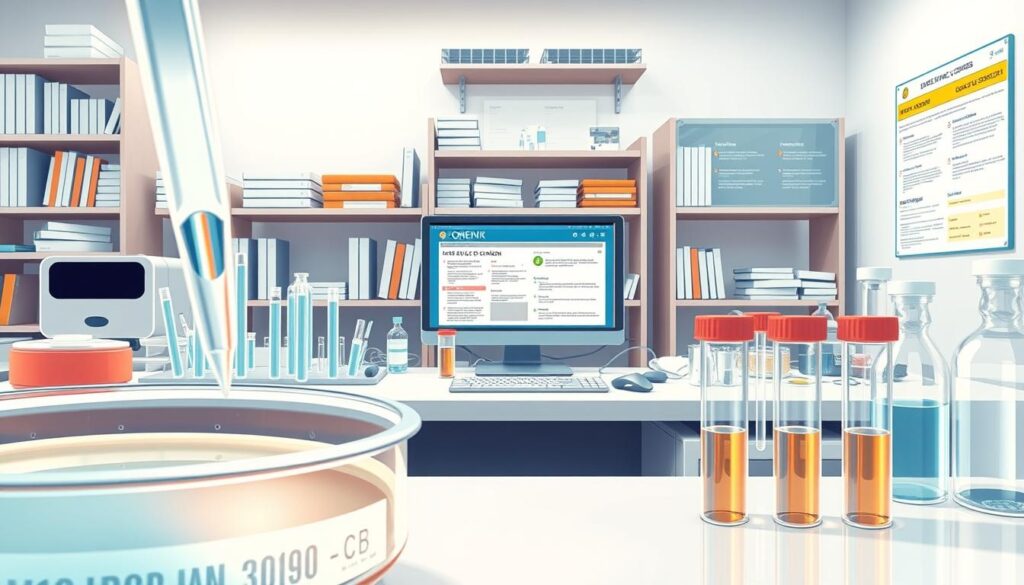
Registered Behavior Technicians (RBTs) face strict drug testing rules to keep workplaces safe and uphold professional standards. The drug screening process for RBTs changes in different healthcare settings. It has set testing times to keep things fair and protect clients.
Here are some common drug testing patterns for RBTs:
- Pre-employment screening
- Random periodic testing
- Post-incident evaluations
- Annual complete assessments
Employers decide on drug testing for RBTs based on important factors. Workplace environment, client interaction risks, and organizational policies play big roles. Some places test every quarter, while others do it once a year.
The drug test frequency depends on:
- Organizational risk assessment
- State regulatory needs
- Individual workplace policies
- Previous testing history
RBTs should be ready for surprise tests. These random checks keep the profession high and clients safe. Knowing these patterns helps RBTs stay ready and follow workplace rules.
Medical Marijuana and RBT Drug Testing
Medical marijuana use is a big challenge for Registered Behavior Technicians (RBTs). They must follow strict drug testing rules. These rules are based on legal and professional standards.
RBTs face tricky situations when medical marijuana and their job duties mix. They need to find a balance between their patients’ health and their own professional rules.
State Laws and Regulations
Medical marijuana laws change a lot from state to state. This makes it hard for RBTs to follow the rules. They need to know about:
- How to get medical marijuana in their state
- Legal rights for healthcare workers
- Any differences between state and federal laws
Workplace Accommodations
Employers have to think carefully about medical marijuana in the workplace. RBT drug testing rules aim to keep patients safe while respecting medical needs.
| State Category | Medical Marijuana Workplace Policy | RBT Implications |
|---|---|---|
| Recreational States | More lenient regulations | Potential workplace flexibility |
| Medical-Only States | Strict documentation requirements | Detailed medical authorization needed |
| Restricted States | Limited or no accommodations | Potential professional restrictions |
RBTs should keep up with changing laws and talk openly with their employers about medical marijuana.
Preparing for an RBT Drug Test
Registered Behavior Technicians (RBTs) need to know the rbt drug test procedures. This knowledge helps them go through the screening smoothly. Being prepared shows confidence and professionalism.
Before your drug test, consider these essential preparation steps:
- Gather all necessary identification documents
- Review your current medications
- Stay hydrated but avoid excessive water intake
- Get adequate rest the night before
Telling about your medications is very important. Be open about any prescription drugs that could affect your test. Bring your medication documents to the test.
| Preparation Area | Recommended Actions |
|---|---|
| Documentation | Bring valid photo ID and medical records |
| Physical Preparation | Get sufficient sleep, stay hydrated |
| Medical Disclosure | List all current prescriptions |
Knowing your rights during the drug screening can ease your mind. Labs follow strict rules to make sure tests are fair and accurate. Be professional and open during the test.
Some foods can affect your test results. Try to avoid eating poppy seeds, hemp products, or too much vitamin B before your test.
Common Substances Tested in RBT Screenings
Drug tests for registered behavior technicians are thorough. They make sure patients are safe and professionals act with integrity. These tests look for substances that could harm job performance and client care.

Registered behavior technicians face strict drug screenings. These tests check many substance types. They protect both the professionals and their clients.
Prohibited Substances in RBT Drug Testing
The main substances banned in drug tests for registered behavior technicians are:
- Illegal street drugs (cocaine, heroin, methamphetamine)
- Synthetic cannabinoids
- Hallucinogenic substances
- Unauthorized prescription medications
- Performance-enhancing drugs
Prescription Medication Policies
RBT drug tests also consider prescription medications. Healthcare providers must follow certain rules:
- Provide documentation from a licensed healthcare provider
- Disclose all current prescription medications
- Demonstrate that prescribed medications do not impair professional capabilities
- Obtain clearance from medical review officers
Being open and talking early about prescription medications is important in drug screenings.
Impact of Drug Testing on RBT Certification
Drug testing for registered behavior technicians is key to keeping standards high and clients safe. The Behavior Analyst Certification Board (BACB) views substance use very seriously when checking RBT certification.
RBT drug testing rules can greatly affect a technician’s career. If a technician fails a drug test, they might face serious consequences:
- Immediate suspension of certification
- Mandatory reporting to the BACB
- Potential certification revocation
- Required rehabilitation programs
Certification reinstatement is a detailed process that shows a technician’s commitment. If a technician fails a drug test, they must:
- Undergo a thorough substance abuse evaluation
- Complete suggested treatment programs
- Submit proof of rehabilitation
- Pass future drug screenings
- Show they are competent in their job
The BACB’s strict rules make sure RBTs keep high professional standards. These drug testing rules protect clients and keep behavioral health services trustworthy.
It’s important for professionals to know that drug testing is not meant to punish. It’s a vital part of keeping healthcare safe and ethical. Being open and following rules helps avoid certification problems.
Drug Testing Costs and Coverage
Registered behavior technicians (RBTs) need to understand the costs of drug testing. These costs can affect both employers and employees. Knowing about RBT drug testing policies is key.
There are several financial factors to consider:
- Pre-employment screening costs
- Random drug test expenses
- Periodic testing fees
- Potential insurance coverage options
The cost of drug tests for RBTs can be between $30 to $75 per test. Usually, employers pay for these tests. But, some places might ask employees to chip in a bit.
What kind of test you get can change the cost:
- Urine tests: Most affordable ($30-$50)
- Saliva tests: Mid-range pricing ($40-$60)
- Hair follicle tests: Most detailed ($100-$150)
Health insurance usually doesn’t cover drug tests for getting certified. RBTs should plan to pay for these tests themselves. It’s part of their job and keeping up with rules.
Some health groups might help with the cost of drug tests. It’s important for RBTs to talk about money matters when they’re hired.
Conclusion
Drug testing for Registered Behavior Technicians (RBTs) is key to keeping healthcare standards high. RBT drug testing policies make sure patients are safe and services are trustworthy. This is true in all clinical settings.
Healthcare groups use detailed screening to check if RBTs follow professional rules. When RBTs get drug tested, they show they care about quality care and safety at work. These steps keep people who need help safe and make sure behavioral health workers are respected.
RBTs should see drug testing as a big part of their job. Knowing and following RBT drug testing rules helps them give the best support to those with developmental challenges. It also keeps their work open and honest.
Drug testing is a way to protect both healthcare workers and their clients. RBTs who know about testing and follow rules are essential in giving caring and effective help in many healthcare places.
